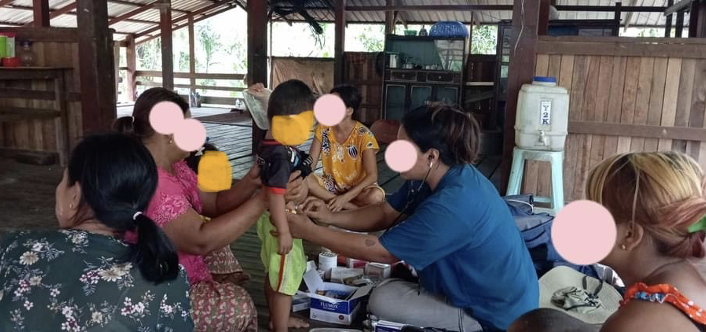Aid workers providing medical care in Internally Displaced Person (IDP) in Tanintharyi Township, Tanintharyi Region, report that they are facing a shortage of anti-malarial drugs due to the military council’s restrictions on medicine supplies at checkpoints.
They report an increase in malaria cases in the IDP camps in April and May as more IDPs arrived. However, there is a shortage of malaria test kits, medicines and even volunteers who can provide treatment.
Not only are there too few malaria tests and drugs for treatment, but there are also too few trained volunteers who can provide malaria treatment, said a woman in charge from the Nway Oo Myittar Refugee Assistance Association, which is assisting the displaced.
“Malaria cases are widespread in Tanintharyi. This month, cases have increased in the makeshift camps. There is a shortage of medicines and malaria test kits in the restricted areas. Last year’s supply is no longer sufficient. The displaced people are being asked to stay in their villages. The malaria response teams can’t reach the camps,” said the woman.
Amid the shortage of medicines, the military council has reportedly arrested and inspected those who travel to the town to seek treatment or buy medicines.
With supplies for treating villagers and internally displaced people dwindling, emergency treatment has become a concern, she added.
“People don’t dare to go to town to buy medicines and village patients don’t dare to go to get treatment either. Our village, Taku village in Tha Ya Bun village tract, has been labelled as a ‘black area’, so those who go out to buy drugs there get arrested. There is no access to medicine supplies. In the villages, seriously ill patients have to be treated via infusions,” she added.
The restrictions on the transportation of general goods also mean that the displaced people urgently need food as well as materials for shelter, mosquito nets and medicines.
According to an official from Fe 5 Tanintharyi, the number of IDPs increased to about 60,000 in April due to fighting in Dawei, Tha Yet Chaung, Yebyu, Palaw and Tanintharyi towns.
“There isn’t enough rice and food for the displaced people. They only have mere roofs over their heads. They don’t even have medicated-mosquito nets. Around 6,000 people live in the five permanent camps. The rest are temporarily displaced people. The aid workers are helping them as best they can,” said the official.
As of mid-May, 35 Plasmodium Vivax (PV) malaria cases were reported in the eastern Tanintharyi villages and 11 PV cases in the southern villages, according to local media reports.
Sent IMNA.

